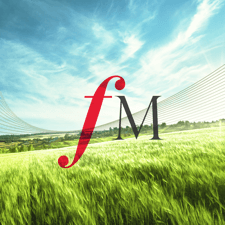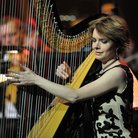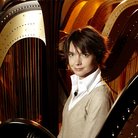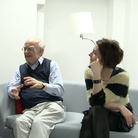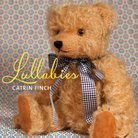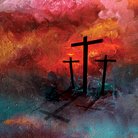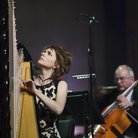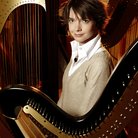Talk to Catrin Finch at ClassicFM.com
Electric harps, playing piano music on the harp, and collaborating with John Rutter - you posed your questions to harpist Catrin Finch.
Former Royal Harpist Catrin Finch is currently preparing for her upcoming Christmas concerts, following the release of her latest album with John Rutter. In between daily practice, she spared a few moments to answer your questions about playing the harp and collaborating with such a well-known choral composer.
Tim Lihoreau: Hello, hello, hello! And this morning our Wednesday Webchat is with harpist Catrin Finch. I thought we should kick off with a question from John Suchet - as your brand new CD is his Album of the Week this week. And here it is:
You've got your own composition for harp and orchestra on this album. I always knew you were a brilliant harpist but I didn't know you were a composer as well - when did you begin to write your own material? John Suchet
Good morning! Good to be having an interview in front of the fire - am not in my pyjamas though, I promise! I started composing last year when I took 6 months out from performing to devote a bit of time to developing my composing side. I have always had an interest in that side of things and done a lot of improvising and experimenting over the years, but decided I wanted to concentrate a bit more on it!
The composition on this album came about because we were 10 mins short and needed another piece so I offered to chip in, and had to finish this work quickly in a few weeks so it could go on the album! Very exciting though to have my first work recorded and put out on a DG album. Chuffed to bits!
Tim Lihoreau: Was it a big step putting your music on display? A little more 'soul bearing' than you normally do? Or is the interpretive side of performance similar?
Yes it was a big step, and I was a bit out of my comfort zone if I'm honest. Its a much different process actually writing down every note and interpretation, to improvising on the spot. I find improvising very easy and so want to look at composing as an extension to that, but it does take practice as with anything! I guess in a way as a performer we put our on stamp on all compositions all the time, but somehow when you need to sit down and write a work by a certain date the pressure is on and you can find yourself sitting and staring at the piano keyboard and a complete blank. But I found inspiration can come at the strangest times and in the funniest places...
Parsons Books & Music: I love your recording of the Goldberg Variations. Obviously harpists look to keyboard as a source of repertoire from time to time - do you have a work for keyboard you would like to play on harp that nobody else has before?
Thanks - glad you like the Goldbergs. Im always looking for new things to play because repertoire is always an issue for us. I am looking at doing some more of Bach's work - I am his biggest fan! Some of the Preludes and Fugues work very well and have started taking a look at a couple of his suites. Also bought the music for Mussorgsky's Pictures at an Exhibition at an exhibition a while back - its still on top of the piano in a pile at the moment, but may well find its way onto my stand soon!
Parsons Books & Music: Mussorgsky, cool - I never throughout of that on the harp but can really hear that working! Thanks, Catrin. It's great to be able to say hello.
No promises - looks quite hard if I'm honest!
Tim Lihoreau: Can I ask more about the new album. It's called Blessing and it is you plus John Rutter. "How did it come about", is my rather obvious question? Why John "Father Christmas" Rutter? And were you tempted to put some of his Christmas repertoire on there?
Ha - yes he is famous for his Christmas music isn't he! It came about after a chance meeting with John in the lobby of the Landmark hotel in London, and I asked whether he would consider writing a harp concerto (I tend to ask this a lot to composers!). He was keen to give it a go, but admitted he didn't write a lot for instrumentalists. However a year or so later the Suite Lyrique turned up and I performed a few times, and through conversation with Mark Wilkinson at DG we decided to record it and make a John Rutter/Catrin Finch album. We decided to keep away from Christmas music to make it a bit different from lots of John's other albums - think we came up with a good balance of old, new and traditional.
Tim Spires: I'm always slightly scared when even looking at a harp... there are so many strings and pedals and it looks really complicated to play. Do you still need to practise every day? Do you play any other instrument and if so how does it compare?
The main difficulty in playing the harp is co-ordination between hands and feet. Quite often its the pedalling that is most difficult, especially being able to do it so nobody notices! I do try and practice most days - I have 2 young girls who are 5 and 2 so sometimes its a challenge to find the time, but its always a good idea to do just a bit to keep the calluses on the tips of my fingers nice and hard! I try and aim for at least 3 hours every day. I play the piano as well ... its a bit like a harp lying down!
Tim Lihoreau: Also on the album is Elin Manahan Thomas. That seems a match made in heaven. I'm assuming you are... friends, neighbours, she pops in to borrow a cup of sugar, that sort of thing. How do you go about choosing some of your collaborations, like Toumani Diabate?
It was a wonderful pleasure working with Elin - she is an amazing musician. I have worked with her a lot in the past, and because of her links with John and his music, it felt like a natural choice to get her involved with this album. Mostly collaborations come to me or get offered through performing or recording opportunities. I always think the most important thing for me as a harpist is to be open to all sorts of different projects and styles of music - I enjoy getting involved with lots of different things and styles - and have been doing a lot more world music recently working with Toumani Diabete and more recently Seckou Keita (both Kora players), and for the past few years have played a lot with a colombian band called Cimarron. I love collaborations - I spend a lot of time working by myself because I'm a harpist and never need accompaniment - so its always a great excuse to enjoy music with someone else!
Hywel Acapela: Where and when will you be performing next? Do you have many concerts between now and Christmas?
Im playing in London tomorrow at St Johns Smith Square with Sinfonia Cymru (music from the album), then the following week I am working with the BBC National Orchestra of Wales playing Tailleferre and Ravel, then the usual Christmas concerts and events in December that keep us busy! Next year I will be taking the Goldberg Variations on tour again in Feb/March, concerts in Dubai, New York, Barcelona, some recitals and festival appearances in the UK, and also need to fit in time to write a concerto for orchestra and electric harp which I will be performing in wales and Germany with the National Youth Orchestra of Wales next summer! Thats a bit scary actually...
Mark Morgan: I am curious to know if you have ever played a laser harp in the past and how you found it, as it no doubt has a very different feel from a traditional harp? I also would be interested if you think there is a place in classical music recording and orchestral performance to take such instruments to the next dimension. I have seen recordings of you playing a hand-held electric harp, so I thought you may have some interesting views on how you think the modern instrument sounds versus the traditional.
I have never played a laser harp! I am very interested to try - would be very different from playing a normal harp because there are no actual strings to pluck and so I can't imagine just playing air! There is always a place for such instruments in all musical genres I think. As in my last post, I have just been commissioned to write a concerto for electric harp and orchestra. Electric harps work much the same as acoustic instruments only you have the capability of connecting to effects units and looping machines etc that can be a lot of fun to experiment with! I love that side of things as well and spend a lot of time up at the studio developing ideas and playing with all the studio equipment. I like the way you can mix traditional sounds with modern effects and create a whole orchestral sound with just the one instrument. It opens up a whole new world for me!
Tim Lihoreau: Well, Catrin, can I just say thanks ever so much for talking to us. Good of you to spare the time and all the best with the new album. Cheers.
Don't forget, we'll have another web chat at 9am next Wednesday, when we'll be talking to percussion star, Dame Evelyn Glennie. Get your questions ready!
